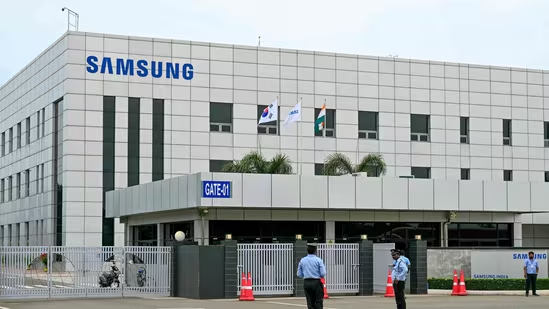Workers at Samsung Electronics’ southern India facility will persist with their strike until their demands for improved wages and working conditions are satisfied, according to union leaders. Production at the consumer appliances unit has been disrupted for a third consecutive day. This plant, which manufactures items like televisions, refrigerators, and washing machines, accounts for approximately 20% to 30% of Samsung’s annual $12 billion revenue in India, a crucial growth market for the company. The strike will continue until an agreement is reached, with the next round of negotiations scheduled for Friday evening, as stated by union leader E. Muthukumar.

On September 11, 2024, workers held a protest at Samsung India’s plant in Sriperumbudur, near Chennai, demanding higher wages and official recognition of their union.(Getty Image)
“As it stands, the strike will extend until Friday,” Muthukumar confirmed.
The Samsung facility is located adjacent to production units of other global giants such as Foxconn and Dell, in a region renowned for its automobile and electronics manufacturing.
The plant, which makes products such as televisions, refrigerators and washing machines, contributes between 20% and 30% of Samsung’s annual $12 billion revenue in India, a key growth market for the company.
“The strike will persist until a resolution is reached, with the next round of negotiations scheduled for Friday evening,” union leader E. Muthukumar informed Reuters.
“As of now, the strike is set to continue until Friday.”

The Samsung factory is located in an industrial area that also houses major global corporations such as Foxconn and Dell, known for its focus on automobile and electronics manufacturing. On the strike’s first day, Monday, half of the daily production was disrupted. On Tuesday, the impact lessened to 30%, as some temporary workers were brought in to maintain operations, according to a source with direct knowledge of the situation.
The workers are demanding that Samsung officially recognize their union, increase wages, and improve working conditions, including better working hours. JB Park, the CEO of Samsung Southwest Asia, along with other senior executives, has visited the factory in an attempt to address the protests.
“They (Samsung) will eventually have to engage with us, just as they were compelled to negotiate with the union in South Korea,” Muthukumar remarked. In July and August, the 36,500 members of Samsung Electronics’ largest workers’ union in South Korea sought higher wages and benefits through several days of striking, although production remained unaffected during that period.
Samsung, headquartered in South Korea and recognized as India’s largest consumer electronics company, has yet to issue a statement in response to requests for comment. On Monday, a spokesperson for Samsung India stated that the company is actively engaging with workers “to address any concerns they may have while ensuring compliance with all relevant laws and regulations.”
In India, the strike comes at a particularly crucial time, just ahead of the festive season, when consumer spending typically surges, and companies offer substantial discounts.
Numerous workers, clad in Samsung’s blue uniform shirts and donning red CITU caps, were seen sitting inside a makeshift tent erected near the factory, which employs approximately 1,800 workers.
Meals were organized by the workers and distributed on Wednesday afternoon.
Earlier in the day, employees gathered outside the factory, chanting in unison: “We will stand together and secure victory.”
Meanwhile, Samsung’s other manufacturing plant in the northern state of Uttar Pradesh, which produces smartphones, has experienced no labor unrest.
Given that the strike is taking place just before India’s festive season—an important time for consumer electronics sales—the disruption could affect Samsung’s ability to meet demand during this critical period.
The workers’ demands for union recognition, wage increases, and better working hours are key factors in the ongoing negotiations. If the strike prolongs without resolution, it could lead to further production delays, impacting both local sales and Samsung’s overall supply chain in India.



